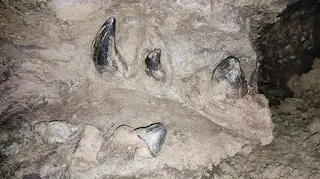Prehistoric Discovery: Core Geo Expedition Finds Ancient Fossil Structures
A team of explorers from Core Geo Expedition has made a remarkable discovery in Meghalaya, uncovering rare fossil structures estimated to be around 30 to 40 million years old. The fossil structure was found in the remote Gongdap village near Tolegre in South Garo Hills district during an expedition in February 2024.
Tolegre village, situated approximately 10 km from the renowned town of Siju, served as the focal point for a three-week exploration by the team of explorers. The apparent discovery was made in the subterranean parts of the region, after traversing over 9 km of underground passages.
"The preliminary investigations suggest that the fossil appears to be 35-40 million years old. However, further testing will be required to confirm the exact age and species," stated S Avasthi, the district magistrate of South Garo Hills.
A palaeontologist from the Geological Survey of India (GSI) had initially visited the site for examination, and the main GSI team is expected to arrive soon to conduct further verification and analysis.
"We believe this fossil dates back to about 35-40 million years ago and belongs to either the genus Rhodocetus or Ambulocetus, both of which are now extinct. This could potentially be the first of its kind discovered in India, but further verification is needed," said Ayush Singh and Thomas Arbenz of the Core Geo Expedition.
Rhodocetus or Ambulocetus are prehistoric animals believed to be the land ancestors of whales.
Expressing concern over the preservation of the fossil, the Core Geo Expedition urged the Meghalaya government to promptly examine the site, as it is vulnerable to natural and human forces, especially with the onset of the monsoon season.
"This fossil holds immense scientific significance, potentially marking the first of its kind discovered in India. It is imperative that it be examined promptly to unravel its secrets and contribute to our understanding of prehistoric life," the Core Geo Explorers emphasized.

 News Reporter
News Reporter
